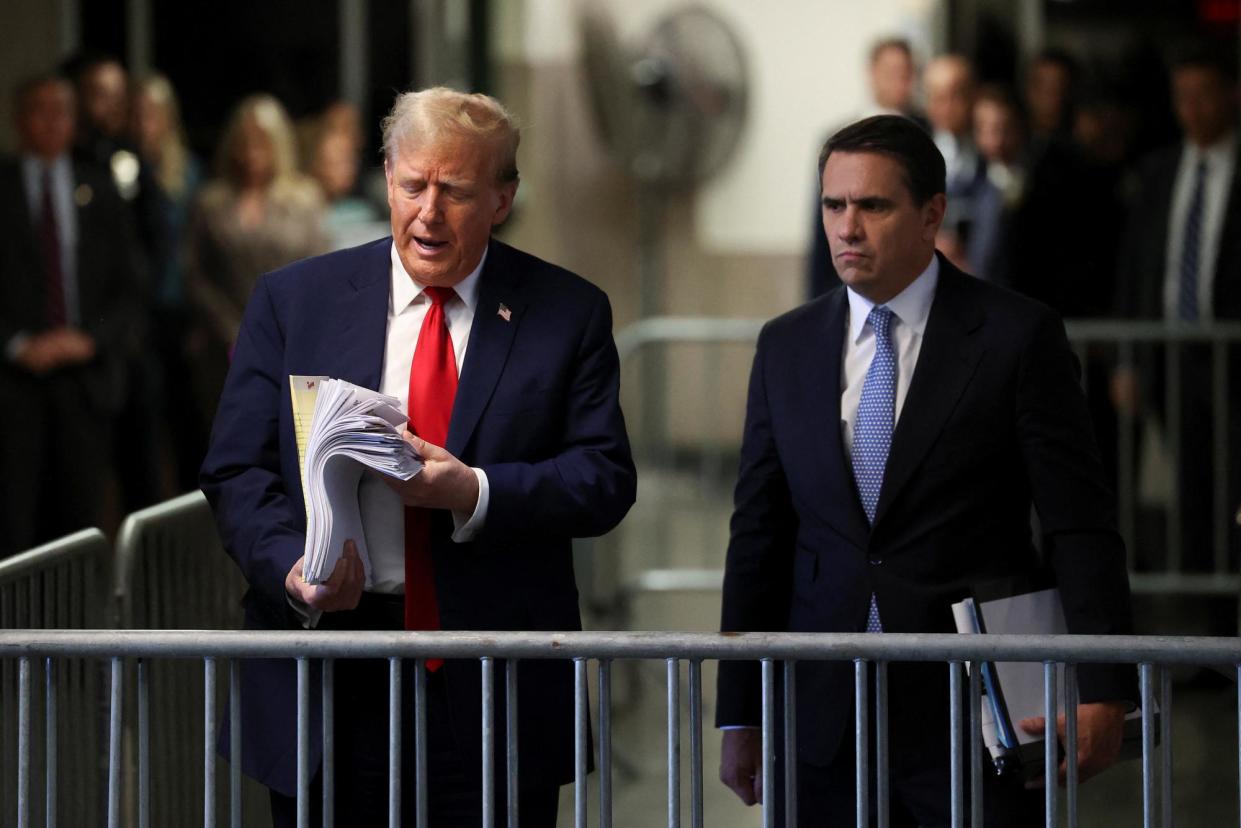Skeptical judge and tabloid deal: key takeaways from Trump trial day six

Donald Trump watched the judge presiding in his New York criminal trial dramatically admonish his lead lawyer and hear the prosecution’s first witness confirm that Trump specifically enlisted the help of the National Enquirer tabloid to kill negative stories that could derail his 2016 campaign.
Here are the key takeaways from Tuesday’s proceedings in People of the State of New York vs Donald J Trump.
Related: Who is David Pecker, a key witness in Trump’s criminal hush-money trial?
Judge skeptical of Trump’s lawyer
The presiding judge, Juan Merchan, was clearly unimpressed by Trump lawyer Todd Blanche’s desperate attempts to save Trump from being held in contempt for allegedly violating a gag order prohibiting him from attacking potential trial witnesses and other participants.
“Mr Blanche, you’re losing all credibility, I have to tell you right now,” the judge said. “You’re losing all credibility with the court. Is there any other argument you want to make?”
Prosecutors in the Manhattan district attorney’s office had for asked Trump to be fined the maximum $1,000 for each of 10 posts they contended violated the gag order, because Trump directly and indirectly went after his former lawyer Michael Cohen and the adult film actor Stormy Daniels.
The judge has held off on finding Trump in contempt, for now. But he appeared deeply skeptical of arguments made by Blanche, who found himself on the back foot over the course of the contempt hearing, which was held before the trial resumed with testimony from the prosecution’s first witness.
Blanche tried several explanations for the posts: Trump was responding to political attacks, which are allowed under the gag order, and Trump was reposting links to New York Post stories or quotes from other people such as Fox News host Jesse Watters.
Merchan was unimpressed. He questioned why in one post, Trump waited until after a challenge against the gag order had been rejected by a New York appeals court to “respond” to a jibe from Cohen, instead of replying immediately, to which Blanche had no response.
The judge also invited Blanche to present examples of cases where reposts were ruled to be any different from posts authored by a defendant, and to provide the specific political attack against Trump. “Give me one. Give me one recent attack he was responding to,” Merchan said.
The contempt hearing ended particularly poorly for Trump when the judge interrupted Blanche to clarify that it had been wrong to characterize one post as just reposting a Watters’ quote from television. Trump “manipulated” the quote by making his own additions, and then put quote marks around it, Merchan said.
National Enquirer deal was to help 2016 campaign
Manhattan district attorney prosecutors wasted little time in eliciting testimony from David Pecker, the former National Enquirer chief, that Trump had personally enlisted him and the tabloid to help his 2016 campaign, when the trial resumed on Tuesday afternoon.
The link is important because the district attorney’s case revolves around elevating misdemeanour charges for falsification of business records to felonies, by proving they were in furtherance of a second crime:conspiring to promote an electoral campaign through unlawful means.
On the stand, prosecutors got Pecker to confirm that in a meeting with Trump and Cohen, he had been asked how he could help the 2016 campaign. Pecker said he told them he would be the “eyes and ears” for the campaign and keep them abreast of negative Trump stories.
Specifically, Pecker testified he would alert Cohen to negative Trump stories brought forward by women: “When someone is running for a public office like this, it is very common for these women to call up a magazine like the National Enquirer to try to sell their stories.”
That, of course, was exactly the situation with Trump and Daniels, who had a story about an alleged affair with Trump, which Pecker later identified as potentially damaging to the 2016 campaign with female voters given it arose soon after the release of the infamous Access Hollywood tape.
Prosecutors also had Pecker confirm that Cohen had wanted the arrangement to be kept confidential, with the inference being that it would otherwise undermine the point of having the National Enquirer “catch and kill” negative stories about Trump before the 2016 election.
Trump’s criminal hush-money trial: What to know
A guide to Trump’s hush-money trial – so far
The key arguments prosecutors will use against Trump
From Michael Cohen to Stormy Daniels: The key players
Trump managed his own finances
Manhattan district attorney prosecutors had Pecker recount in detail how Trump personally reviewed and approved invoices and other financial documents – another important detail given that Trump’s defense hinges in part on the claim that he delegated everything to people like Cohen.
“While he was reviewing the accounts payable packages, we were talking at the same time, and I noticed that he reviewed the invoice, looked at the check, and he would sign it,” Pecker recalled.
The prosecutor Joshua Steinglass then asked Pecker how the documents had been presented to Trump, trying to establish that Trump was meticulous with his finances and that it was not the case that Trump was signing seemingly random checks without knowing what they were for.
“As I recollect, the entire package was stapled together,” Pecker said in response to a question asking if the check had been stapled to the invoice. “I thought that his approach to money, he was very cautious and very frugal.”
Biden v Trump: What’s in store for the US and the world?
On Thursday 2 May, 3-4.15pm ET, join Tania Branigan, David Smith, Mehdi Hasan and Tara Setmayer for the inside track on the people, the ideas and the events that might shape the US election campaign. Book tickets here or at theguardian.live

 Yahoo News
Yahoo News 
